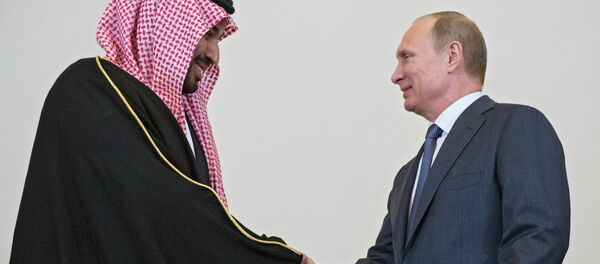Despite talk of the high-level meetings constituting a 'historic breakthrough', political scientist Vladimir Efimov does not believe that Saudi Arabia will be able to become a real partner for Russia, citing Riyadh's close alliance with Washington, friction over the two sides' positions on Iran, Syria and Yemen, and Moscow's historic animosity toward the ideology of Wahhabism.
Efimov's article, entitled 'Saudi Trap for Russia?', begins by pointing out that the Saudi Crown Prince's visit was surprising to Russian analysts precisely because "it is well known that Riyadh has never been known to have sympathy for Moscow. Moreover, such 'historic breakthroughs' have been repeatedly declared in the past, including during Vladimir Putin's visit to the Kingdom in 2007, without anything of substance resulting from them. During the so-called Arab Spring, the Russian and Saudi positions were diametrically opposed to one another: Moscow was against the overthrow of the regimes in Syria, Libya, Yemen, etc., while the Kingdom of Saudi Arabia not only encouraged and funded the opposition, but also put spokes in the wheels of Russia's efforts to put an end to the chaos caused by Islamist extremists in Russia itself. So what happened? Where did such a surprise, apparently supported by both sides, come from?"
So far, according to Efimov, "nothing much has happened. The Saudis have not actually committed to the billions of dollars in supposed agreements. Memorandums on the intentions of the two sides, whether in military-technical cooperation, cooperation in the oil sector, in nuclear energy, space, or investments – these remain for now as nothing more than declarations."
"And there were other multi-billion dollar decoys. This was the specialty of Prince Bandar bin Sultan, who in his own time was responsible for the security services of the Kingdom, and who twice, on the eve of the Olympic Games in Sochi, came to Vladimir Putin with enticing monetary offers and even promises to prevent terrorist attacks on Russian territory during the Olympics. But it did not work out; this time the Russian leadership did not believe Bandar. But there were two major terror attacks in Pyatigorsk and Volgograd a few weeks before the opening of the Olympic Games."
"So what happened?", Efimov asks. "Has Riyadh improved? Has it changed its attitude toward Russia? And, if so, what about the continuation of the old policy line by new King Salman to overthrow the regime in Damascus, or the beginning of an air war against Yemen? No, the aggressiveness of the new leadership of the Kingdom after the death of King Abdullah has not declined, and has only grown."
The political scientist notes that the Saudi delegation's visit to St. Petersburg, which included not only the Crown Prince, but also the oil and foreign ministers and a slew of other high-ranking officials, appears to have enchanted some Russian experts. In the midst of the intensification of US and EU sanctions against Moscow, some of these experts have even proclaimed, prematurely, that "Riyadh's foreign policy trajectory no longer coincides with that of Washington, because the Saudis, in their words, are disappointed over the US over the decision to begin restoring relations with Tehran."
"Of course, having been defeated in so many areas –from Yemen, to Syria, Iraq, and Iran, Saudi Arabia has gained a keen awareness that the US is no longer the only major player in the Middle East, and that it is necessary to look for new partners. And that Russia has begun to play an increasingly important role, whether in Syria, Yemen, Iraq or Iran, is a fact which is no longer possible to ignore by the Kingdom's rulers."
Efimov cites London-based Saudi newspaper Al-Sharq al-Awsat, which recently commented that Riyadh's intention "to bring Russia to its side" over Syria, Yemen, Lebanon and Iran will require "concentration and consistent work." In Efimov's view, "in plain language, the paper is saying that Riyadh should try to buy Moscow off with a great sum of money, so that it stops helping the above-mentioned countries."
Noting that Riyadh's "St. Petersburg demarche" may at first appear to be a reaction to a change in US policy in the region, Efimov argues that "only those poorly versed in Saudi affairs can seriously believe that the Saudi-Russian rapprochement is Saudi Arabia's reaction to US policy in the region. But that this thesis may be used for external consumption is a real possibility."
Two Reasons Why A Real Rapprochement is Impossible
In the first place, according to the expert, "Saudi Arabia is not an independent regional power, which can simply throw hundreds of billions of dollars Russia's way. Riyadh understands that the US would not accept such a move. The entire financial system of the Kingdom of Saudi Arabia is tied to the US Federal Reserve system. Washington needs only to lift a finger to leave the Kingdom without funds. All prepayments for any major transactions are carried out only with the approval of the Federal Reserve, which controls the Kingdom's Ministry of Finance, while American advisers physically sit in all Saudi state institutions related to the flow of cash, including the Energy Ministry."
Given Washington's anti-Russia stance, aimed against Moscow's current foreign policy trajectory, Efimov argues that the idea that a Federal Reserve-dependent Riyadh could actually sign contracts with Moscow for "even five billion dollars" is a practical impossibility. In the analyst's words, were the Saudis to actually "offer $100 billion on a platter to Moscow…Washington would change all the 'new' rulers in Riyadh to ones more palatable to them in a matter of days." In Efimov's view, US military presence around Saudi Arabia and within the Kingdom itself, along with the fact that "the ruling Al Saud family is chock-full with figures disgruntled with the current leadership," are enough to show that the Saudi delegation's visit and its generous promises are nothing more than "a well-planned action, coordinated with Washington, aimed at the further strangulation of Russia."
The second reason why a real Russian-Saudi rapprochement is impossible, according to Efimov, is that "Russia has been, is, and will be the worst enemy of the Wahhabi regime, remembering perfectly well Afghanistan from the Soviet period, and Syria, Libya, Yemen, Iraq and Iran under their recent and present governments."
Therefore, Efimov argues that Saudi Arabia is unlikely to become a true partner for Russia. "There are no doubts about the Kingdom maintaining its alliance with the US, and no hints that the development of relations with Russia will go beyond the traditional Saudi course of diversifying its foreign economic relations – and all this but in the best case scenario."
The views expressed in this article are solely those of the author and do not necessarily reflect those of Sputnik.






